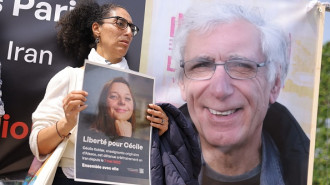Key powers urge immediate resumption of Sudan talks: US
Representatives from the UN, African Union and European powers "called for an immediate resumption of talks" between the two sides, said Tibor Nagy, the US assistant secretary of state for Africa.
They called on the protesters and the Transitional Military Council to "reach an agreement ASAP on an interim government that is truly civilian-led and reflects the will of the Sudanese people," Nagy tweeted.
The talks in Washington included representatives of the United Nations, African Union and European Union.
Countries involved were Britain, France, Germany and Norway as well as Ethiopia, which is the chair of an eight-nation Horn of Africa regional bloc, the Intergovernmental Authority on Development, which includes Sudan.
"We also expressed concern about the recent violence directed by security forces against protesters, and agreed to call for the TMC to allow peaceful protests and hold accountable those responsible for recent violence," he wrote.
Last month, Sudan’s army ousted longtime autocratic president Omar al-Bashir after months of mounting protests led by young people that were sparked by the high cost of bread.
Protesters have remained camped out, saying that they want a rapid transition to democracy rather than continued military rule.
The generals and protest leaders had been expected to come to an agreement on Wednesday on the thorniest issue - the make-up of a new body to govern Sudan for three years.
But the head of the military council, Abdel Fattah al-Burhan, early on Thursday announced a suspension of talks for 72 hours as he demanded that protesters dismantle roadblocks and open bridges and railway lines connecting the capital.
Hundreds of demonstrators heeded his call on Friday, working through the night to clear away bricks and debris, after the military’s demands were announced.
"If our demand is not met, we will return to rebuild the barricade," a visibly angry protester told AFP as behind him demonstrators cleared away bricks and debris.
'Regrettable' decision
Protesters had erected the barricades to pressure the military rulers when talks commenced on Monday, but the roadblocks triggered clashes between demonstrators and security forces according to witnesses.
The military council said roadblocks across Khartoum are "totally unacceptable", but the generals will allow barricades set up by protesters outside the army headquarters to remain and a sit-in there to continue.
Sudanese protesters attended prayers near the military headquarters on Friday, sitting on mats placed in rows on the street.
Talks between the two sides achieved significant breakthroughs on Monday, but were marred by violence which left five protesters and an army major dead.
Protesters blamed the paramilitary Rapid Support Force, but Burhan said there were "armed elements among demonstrators who were shooting at security forces."
The United States and Britain said the authorities were responsible for the violence.
The Alliance for Freedom and Change, which is leading the protest movement, said the move to suspend talks was "regrettable".
"It ignores the developments achieved in negotiations so far... and the fact that Wednesday's meeting was to finalise the agreement, which would have stopped the escalations such as roadblocks."
Protesters are demanding a civilian-led transition, which the generals have steadfastly resisted since bowing to demonstrators' demands and toppling Bashir.
During the first two days of talks the two sides had agreed on an overall civilian structure, including a three-year period for the full transfer of power to a civilian administration.
They had also agreed that parliament be composed of 300 members for the transition, with around two-thirds from the alliance and the rest drawn from other political groups.
But the make-up of the new sovereign council has been the toughest part of the negotiations, with the two sides so far proposing different compositions of the body.
The council is expected to take all key decisions concerning national issues and the generals want it to be military-led, while the protesters insist it have a civilian majority.
The body is expected to form a transitional civilian government, which would then prepare for the first post-Bashir election after changeover period ends.
Follow us on Twitter: @The_NewArab





 Follow the Middle East's top stories in English at The New Arab on Google News
Follow the Middle East's top stories in English at The New Arab on Google News

![The law could be enforced against teachers without prior notice [Getty]](/sites/default/files/styles/image_330x185/public/2178740715.jpeg?h=a5f2f23a&itok=xMdFOAIF)
